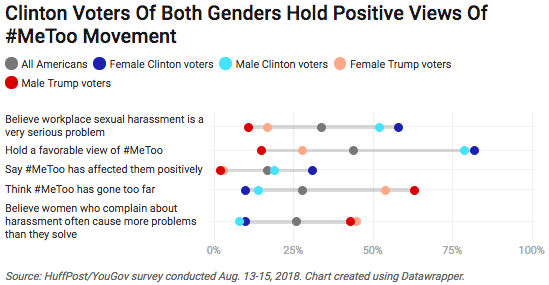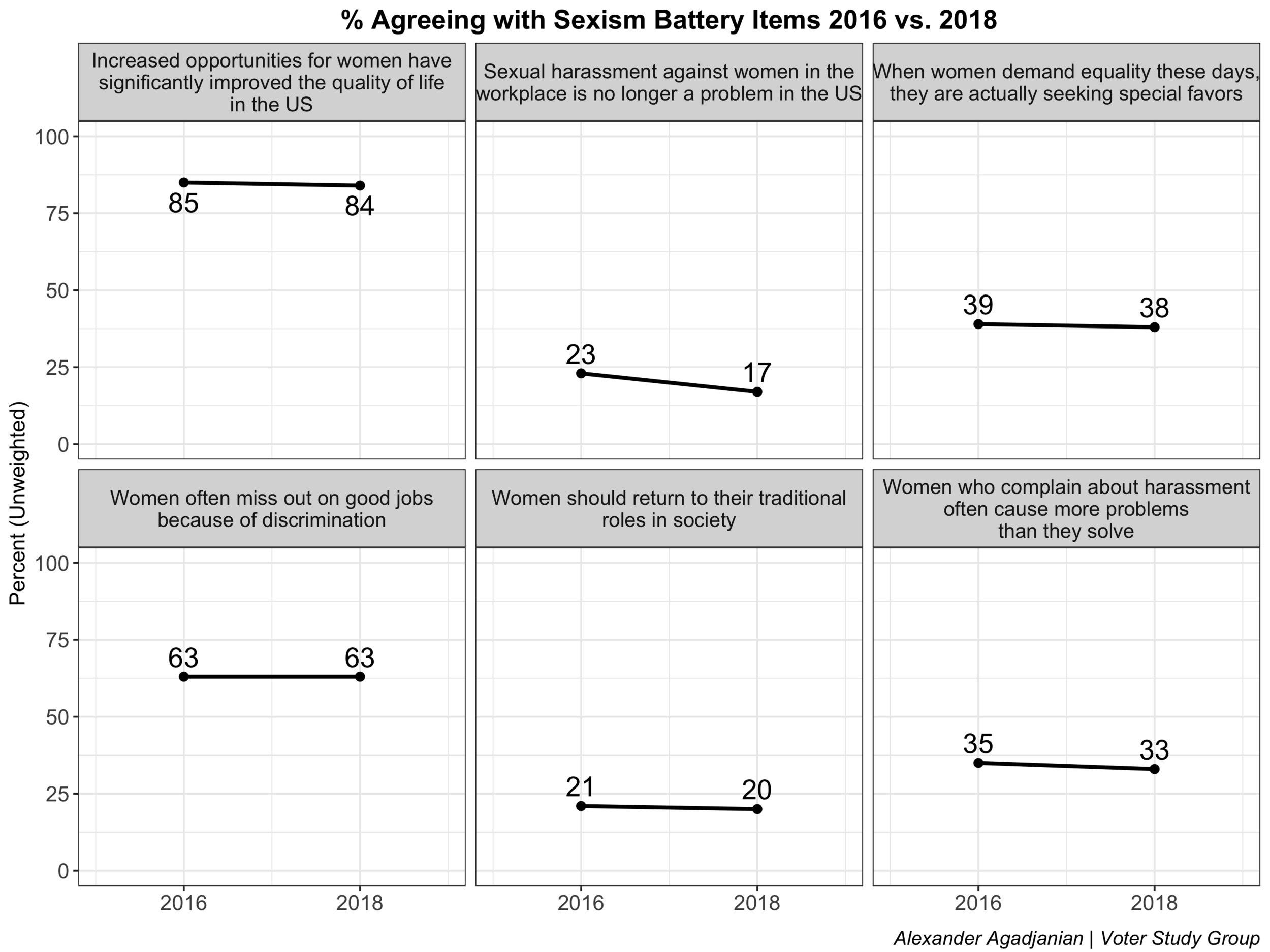data for politics #20: A #MeToo Effect? Attitudes About Gender Equality and Workplace Harassment
By Meredith Conroy (@sidney_b), Alexander Agadjanian (@A_agadjanian) and Hayley Cohen (@HayleyCohen)
Over the weekend the news broke that CBS Chairman and CEO, Les Moonves, would step down from his position, following allegations of sexual harassment and assault by several women, spanning many years. The flood of sexual harassment allegations against mostly powerful men in business, media, politics, and entertainment have largely come to be associated with the #MeToo movement, which is a movement that encourages women to publicly acknowledge or express their experiences with sexual harassment. The origin of “Me too” stems from the work of activist Tarana Burke who has worked with young women of color survivors for years; the hashtag was popularized online by actor Alyssa Milano last October.
As attention to the movement has grown, news media interest in the effects of the movement on attitudes about workplace harassment has heightened. For example, in April, Glamour and GQ polled over 1,000 men between the ages of 18 and 55 to get a sense of how men are reacting, while Vox surveyed women’s reactions. In August, Huffpo released their survey which shows that political partisanship shapes opinions of the movement, with Democrats (men and women) more supportive than Republicans.
Below, we present some evidence of a #MeToo effect by looking at panel data from the Voter Study Group, which asked respondents about gender equality and sexual harassment in the workplace in 2016 and 2018.
The Voter Study Group (VSG) is a collaborative that partners with YouGov to survey the same group of respondents overtime, thereby more precisely capturing change over time than surveys administered to random samples. While the VSG does make their raw data publicly available, the data for 2018 is not yet accessible. Therefore, we rely on their weighted crosstab reports for 2016 and 2018 to present change in opinions about gender equality and harassment in the workplace. Once the 2018 data are available we can look more closely at group-based differences to see whether certain populations are more or less responsive to #MeToo.
The figure shows the percent of respondents who agree with statements about workplace gender equality and harassment. The questions asked respondents whether they strongly agree, agree, disagree, or strongly disagree with each statement. We collapsed the agree and strongly agree categories for the figures below; percentages for respondents who said “disagree” or “strongly disagree” are not shown. Although these questions do not invoke the #MeToo movement explicitly or capture whether respondents are familiar with it, they do probe relevant attitudes are measured before and after the movement’s prominence, and therefore are a useful proxy for opinion change on these topics.
According to the crosstab reports provided by VSG, Americans’ broader views of women’s professional lives have changed little or not at all since 2016 with one exception (Footnote: The margin of error for the 2016 and 2018 survey is 2.2 and 1.8). Among those who agree that “sexual harassment against women is no longer a problem in the US,” we see a six point shift; in 2016, 23 percent of respondents agreed that sexual harassment was not a problem, but in 2018, only 17 percent agreed with this sentiment. This change signals an increase in awareness of sexual harassment in the US.
But this increased awareness of sexual harassment against women in the workplace seems to be just that--an awareness that harassment exists. Increased awareness does not correspond with more Americans agreeing that women miss out on jobs because of discrimination (Q4), or changes in attitudes about whether women who complain about harassment cause more problems than they solve (Q6). Although the data suggests sexual harassment is more widely acknowledged as a problem, there seems to be no change in attitudes toward the women who speak out about the problem.
Taking this data in context with the other studies we mentioned further illuminates #MeToo’s reach. Specifically, for many men, #MeToo is not synonymous with sexual harassment in the workplace. In the GQ survey of over 1,000 men ages 18-55, 41% said they had never heard of the #MeToo movement. But the 2018 VSG study, conducted during the same month, shows that 75.8% of men disagree that sexual harassment is no longer a problem. While the VSG survey includes all men 18 and over and the GQ study includes only men 18-55, the vast distance between these two figures suggests that there are men who recognize the problem of sexual harassment without having heard of the #MeToo movement.
The #MeToo movement, and the discussion of #MeToo in the media may have led to the increased awareness of sexual harassment against women in the workplace. However, this data suggests that the movement may not be changing Americans’ views on other key issues that are connected to harassment: discrimination in the workplace, gender equality, and attitudes about women who speak out against harassment. Although the #MeToo movement may be talked about as a watershed moment for sex equality, its reach is not universal and many attitudes about equality, opportunity, and harassment aren’t yet moved.
Meredith Conroy (@sidney_b) is a senior adviser to Data for Progress. Meredith has a PhD in political science, and is a professor at California State University, San Bernardino campus.
Hayley Cohen (@HayleyCohen) is a graduate of Tufts University and former Lake Research Partners Project Director.
Alexander Agadjanian (@A_agadjanian) is a research associate at the MIT Election and Data Science Lab.
Methodology
The 2016 and 2018 Voter Study Group Surveys were conducted by Democracy Fund and YouGov. The 2016 Voter Study Group Survey was administered online to 8,000 adults (age 18 and over) who had internet access between November 29 and December 29, 2016. The margin of error for this survey is plus or minus 2.2 percent.
The 2018 Voter Study Group Survey was administered online to 6,005 adults (age 18 and over) who had internet access between April 5 and May 14, 2018. The margin of error for this survey is plus or minus 1.8 percent. Respondents were first interviewed in 2011 as part of the 2012 Cooperative Campaign Analysis Project (CCAP). Respondents to the 2016 VSG survey could have previously been interviewed 2 or 3 times: December 2011, November 2012, and July 2016. Respondents to the 2018 VSG survey could have previously participated in 5 surveys: December 2011, November 2012, and July 2016, December 2016, and June 2017.


